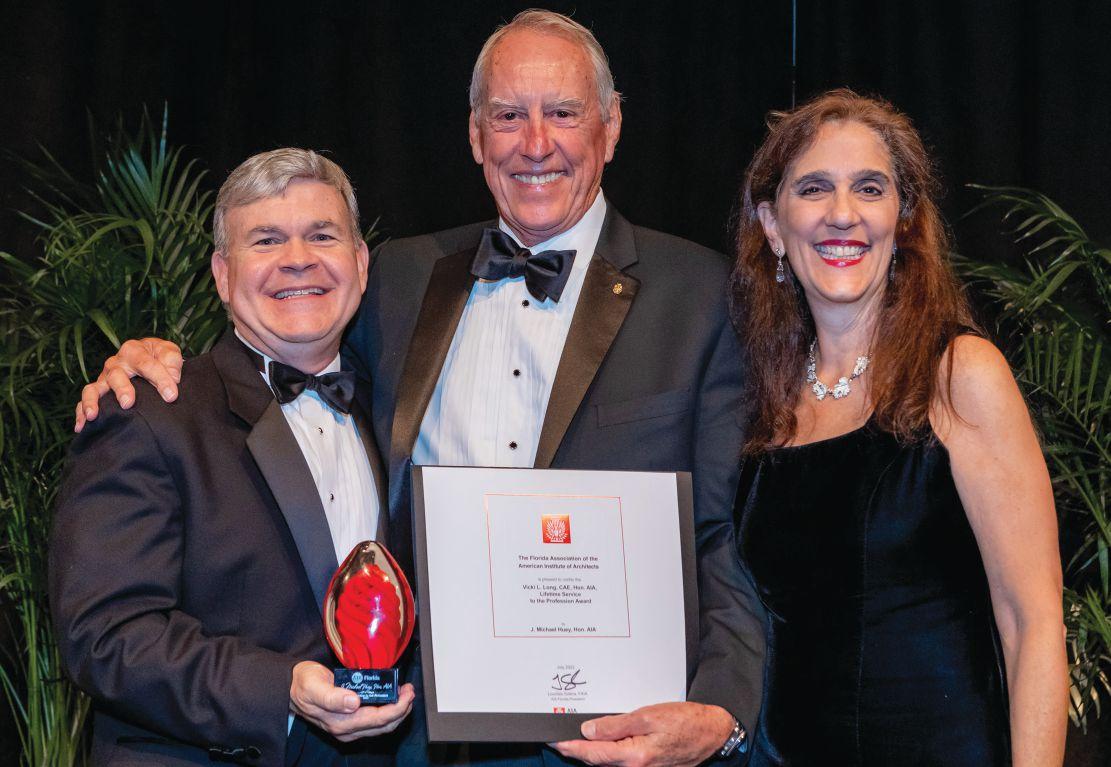
3 minute read
J.C. Newman Cigar Factory
from AIA Florida
Tampa, Florida
Rowe Architects | Tampa, Florida
The redesign of the J.C. Newman Cigar Factory in Ybor City invites the public into the Newman house, John Hadley, AIA, of Rowe Architects said. So when the COVID-19 pandemic hit, the project – with its museum, tour spaces and spectacular room designed to show off the craft of hand-rolling fine cigars – became more of a gamble than it should have been.
In the end, it paid off.
“It’s been an incredible success for their company,” Hadley said of the years-long project that still isn’t quite finished.
In 2018, Rowe architects started the renovation of the factory space. That project has now expanded to include a pocket park and an event space that will re-engage the public, the city and the community, Rick Rowe, AIA, said. The factory is now largely complete, with the pocket park next on the calendar. Finally, the event space will follow, which includes a unique design challenge of rehousing bats.
The building across the street from the factory, which will eventually house a café, a cigar bar and guest space, is currently home to a colony of bats that will need to be moved. Their new home will be custom bat houses in the pocket park.
“We held an in-house contest for the bat houses,” Rowe said. A consultant will see them safely to their new digs early next year. The park will also have space for Newman employees to enjoy a lunch or for visitors to enjoy a cigar.
Those Newman employees will also be enjoying all new workspaces designed by Rowe Architects. Except for the museum, the entire factory is a workspace for the cigar makers and the executive and administrative teams. Even though it is a unique work environment, it is still a work environment, and the Rowe team dealt with some of the same pandemic-related questions that other design teams felt. And, just like in other industries, the pandemic gave Newman’s staff new workflows and the need for new spaces.
The initial, pre-pandemic workplan called for enclosed offices and a conference room.
However, the fortuitous discovery of an original room along with new, pandemicinfluenced workflows led the team to make the decision to give up space for a collaborative work area.
“Throughout the whole project, we worked to understand from the owners and the staff what was needed for manufacturing,” Hadley said. That included not only the new workspace, but also considerations for handling tobacco, such as systems to keep dust down and keep the product appropriately humidified.
It also helped that fourth-generation owner Drew Newman was a lover of architecture, Rowe said. Newman came up with a new product – an entirely American cigar, made with American tobacco, American wrappers, even American wood used in the boxes. And it’s hand-rolled in the Ybor City factory rolling room, open for visitors to see.



Encased in rich woods with custom furniture made by Newman staff in Nicaragua, the rolling room gives visitors a new way to experience the American cigar, and it brings back the tradition of hand-rolled cigars to Ybor City. Framed artwork shows how the rollers worked in the heyday of the Tampa cigar, with lines of men rolling cigars while someone read to them from the newspaper or books.
“We recreated that in this room,” Rowe said.
The Newmans originally set out for the renovated factory to be shown off at the company’s 125th anniversary in 2020, but now, they are planning for a 128th anniversary bash next year.
“The Newmans have been really excellent clients,” Rowe said. “They don’t want to cut corners.”
Aside from a huge overhaul during a pandemic and rehoming a bat colony, working on historic buildings like the Newman spaces offers other surprises.


For instance, in the Newman factory, the Rowe team pulled down conference room paneling to find windows. A talk with some of the Newman old-timers revealed that the room was once the corner of the original building. More work found exterior brick (now interior) and original crown moulding. The details were left in place and restored to add character to the workspace.
Another detail emerged when workers pulled up carpet in a copier room off the conference room. A trap door was cut into the original hardwood floor. Story goes, John Hadley, AIA, said, that in times past the mafia would rob the cigar factories. A factory up the street would tip off the Newmans, who would then run the cash into the basement via a trapdoor, leaving the mob nothing to take when they arrived. Now that trap door is part of the Newman factory tour.
















